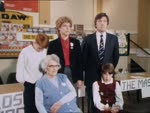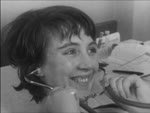HIGHER EDUCATION TODAY: Scottish Independence Referendum Debate
Please read Understanding catalogue records for help interpreting this information and Using footage for more information about accessing this film.
Title: HIGHER EDUCATION TODAY: Scottish Independence Referendum Debate
Reference number: 8792
Date: 2014, March
Director: d. Danilo Ikenberry
Producer: Steven Roy Goodman
Production company: University of the District of Columbia
Sound: sound
Original format: unknown
Colour: col
Fiction: non-fiction
Running time: 28.28 mins
Description:
An episode of the University of the District of Columbia's magazine programme 'Higher Education Today', presented by Steven Roy Goodman; features a debate about Scottish independence and its effect on academia between Dr Stephen Watson, University of Glasgow, founder of 'Academics for Yes' and Professor Hugh Pennington, University of Aberdeen, leader of 'Academics Together'.
Filmed in the Linklater Rooms, University of Aberdeen.
Credits:
p. Steven Roy Goodman
interv. Steven Roy Goodman
WASHINGTON DC CREW:
p. man. Cheryl Lewis Hawkins
post-production manager Derek Whitfield
exec. p. Edward Jones Jr.
ABERDEEN CREW:
vision mixer / director Richard S. Browne
camera operator Martin Hardie
camera operator Euan Henderson
floor manager Rikki Gutcher
sound mixer Colin Wylie
special thanks Aberdeenshire Council, Katrina Allan, Professor Keith Bender, Lois Brown, Brian Hussey, Stanley Jack, Helen Kestle, Jennifer Luray, Carol-Ann Mackenzie-Browne, Professor William G. Naphy, Christian Somme, Euan Wemyss
Shotlist: opening title sequence of brief shots of Aberdeen University campus and student life (0.22) cross-fade to TV studio set-up - introduction by Steven Roy Goodman - Host, Higher Education Today, programme a joint production between University of District of Columbia and University of Aberdeen - discussion topic the impact on education sector of 2014 Scottish independence referendum - Goodman introduces Dr. Stephen Watson - University of Glasgow - Founder, Academics for Yes, and Professor Hugh Pennington - University of Aberdeen - Leader, Academics Together (1.51) Watson explains his reasons for supporting independence: people of Scotland are best suited to governing their own country, 'democratic deficit' in current governance of Scotland from Westminster (3.55) Pennington responds, saying Union has always benefited Scotland and its universities, Scottish Government now looks after them, so no reason to change - Scottish university system has always been an influence on many English universities - UK research is second placed in world, but funding might not be secure under independence - student fees also an issue (7.01) Watson discusses Scottish Government White Paper, notes that it proposes free education for students as opposed to high UK fees - this can be paid for because an independent Scotland would be in top 20 countries in world ranking of GDP per capita, and would also fund research and innovation in private sector - Watson explains geography of Scotland with on-screen map, noting importance of oil, wind and wave power resources (10.55) Pennington responds by claiming that oil is a diminishing resource - that White Paper avoids stating sums of money available for higher education, so danger that vibrant Scottish research sector might be under-funded in future (12.50) Watson points out that at present Scotland is under-funded in private sector research, has become a 'branch economy' - an independent Scotland would fund both sectors equally by ultimately capitalising on renewable energy (14.38) Goodman asks whether a future independent Scottish Government would simply fund higher education through Scottish taxes - Pennington prefers to remain part of UK funding system, as an independent Scotland would struggle to compete on its own, a problem currently for Scandinavian countries (16.50) Watson responds that Scotland would not become a restricted environment, but that the issue is resources for education which would be available - Scotland would continue to co-operate within the UK and also the EU - the proposed UK exit from the EU is a more important issue than the referendum - 'research is boundaryless', and would continue after a Yes vote (19.13) Pennington explains that funding comes to Scotland from EU sources, but would continue to do so even after a UK exit from the EU - but an EU exit is unlikely because of its potential effect on the business sector (21.08) Goodman asks about potential changes to relationship between United States and UK in event of Scottish independence - Pennington cites immediate issue of defence - in terms of academia, relations probably would not change much - political and diplomatic issues would dominate rather than academic (22.29) Watson suggests that academic relationships with US would improve and exchanges would increase (23.44) Pennington notes that devolution to Scotland would increase in the event of a No vote - also Scotland already controls health and education - in event of a Yes vote, change would happen very slowly (26.38) Watson responds by saying a No vote will lead to continuation of austerity, poverty, nuclear weapons, negative impact on universities - Goodman closes discussion, offers web links for further information on participants - thanks and ecs (28.28)






